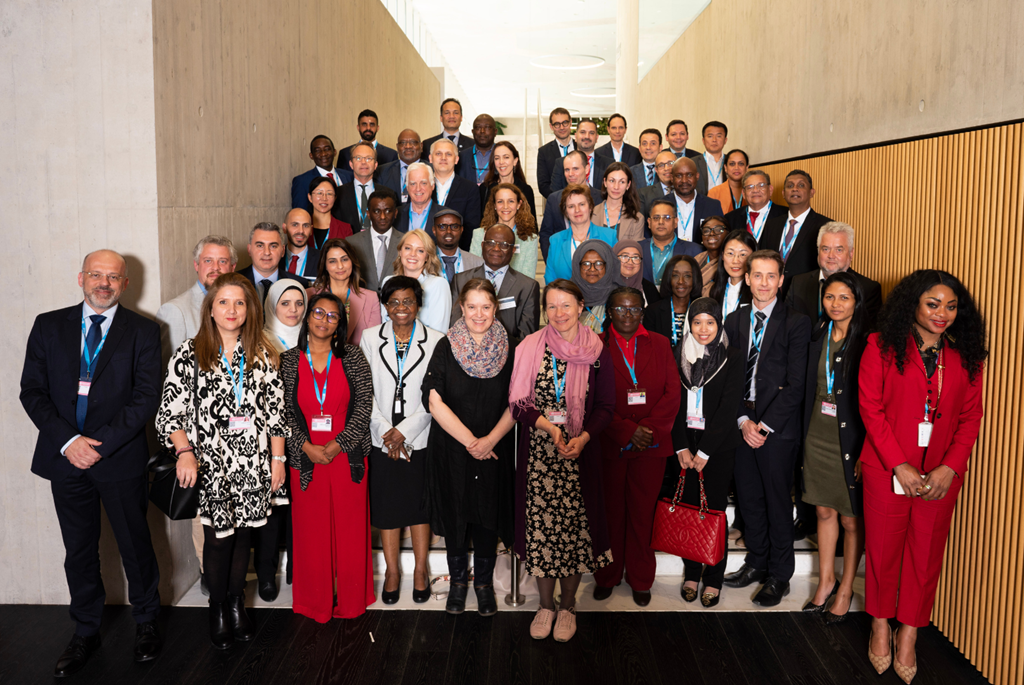
Support to Human and Veterinary Medicines Regulatory Authorities
Support to Human and Veterinary Medicines Regulatory Authorities
The Quadripartite organizations are supporting countries to strengthen their systems, structures and institutional capacities to effective implementation of a coordinated multisectoral One Health response to AMR. This includes enabling robust and coordinated policy, legislative and regulatory environment that meets country needs in a context-specific manner. Specifically, Quadripartite supports countries to strengthen and monitor implementation of policies and laws regarding the appropriate prescription, dispensing, sale, use and disposal of antimicrobials, while promoting universal access to essential antimicrobials and diagnostics across sectors.
In this context, the QJS organized the 1st Global Joint Summit of Human and Veterinary Medicines Regulatory Authorities held in Geneva, Switzerland 4-5 May 2023. The theme of the summit was “Phasing out over-the-counter sales of antibiotics”.
1st Global Joint Summit of Human and Veterinary Medicines Regulatory Authorities to Preserve Antimicrobials, 4 – 5 May 2023 Geneva, Switzerland

The 1st global joint summit of human and veterinary medicines regulatory authorities to preserve antimicrobials, with the theme ‘Phasing out over-the-counter sales of antibiotics,’ was hosted by the Quadripartite organizations - FAO, UNEP, WHO, and WOAH - on 4-5 May 2023 in Geneva, Switzerland. This was part of the planned support of the Quadripartite organizations towards strengthening the regulatory systems towards rational use of antimicrobials and prevention of AMR.
The summit brought together over 250 participants from 100 countries, including human and veterinary medicines regulators, policymakers, scientists, UN agencies, international organizations, and other stakeholders from around the world. The summit agenda was informed by a series of pre-summit consultations with human and veterinary prescribers, civil society as well as industry stakeholders.
The summit reviewed the current global status of over-the-counter sales of antibiotics in both human and animal health sectors and discussed relevant intervention strategies including ‘smart solutions’ to phase out over-the counter sales, unregulated and unlawful online sales, as well as substandard and falsified medicines. The summit recognized the pivotal role of regulators as key partners in the global AMR response particularly leading up to the UN General Assembly High-level Meeting on AMR in 2024. The Summit came up with recommendations relating to political action to step up global commitments to the global AMR response; a forum for sustainable intersectoral collaboration and coordination among human and veterinary medicines regulatory agencies and other key stakeholders, well as technical support by the Quadripartite organizations to scale up implementation at country level.
Quadripartite Legislative Tool
The Development Law Service (LEGN) In collaboration with the FAO Regional Office for Latin America and the Caribbean, the Quadripartite Organizations (UNEP, WHO and WOAH) in Latin America, and their legal teams in Ginevra and Paris, have conducted a regional workshop to present the “One Health Legislative Assessment Tool for Antimicrobial Resistance (AMR)”.
Part of the activities of the 2022 World Antimicrobial Awareness Week, the workshop saw the participation of over 116 experts from the Latin America and Caribbean region, including representatives from the public health, animal health, plant health, pesticide management, food safety and the environmental sectors.
The "One Health Legislative Assessment Tool for Antimicrobial Resistance" was developed by the Quadripartite with the financial support of the Quadripartite Multi-Partner Trust Fund. The tool is in piloting phase and will be published in the second half of 2023.
Speakers highlighted the importance of joint and coordinated action across relevant sectors to prevent and curb AMR. The difference between sector-specific legislation (as human health, animal health, or environmental legislation) that can be implemented by one ministry, and cross-sectoral legislation that needs more than one Ministry to be implemented was underlined.
Most international AMR recommendations can be introduced into sector-specific legislation. As an exception, the establishment of a multisector governance mechanism is better achieved through broader AMR legislation, to be implemented by multiple ministries. Such legislation should not include sector-specific legal elements (for instance on medicines) as that would create legal fragmentation.
The workshop also discussed options to introduce a One Health approach into AMR relevant legislation. The establishment of a multi-sector AMR governance mechanism with participation of human health, animal health, and environment authorities is indeed a first step. However, this is not enough. The One Health approach should also be integrated into each sector, identifying opportunities for collaboration across sectors. Examples of such interventions are the coordination mechanisms for zoonosis management or the provisions on environmental pollution in human health or veterinary laws.

.png?sfvrsn=e17b7c77_0)